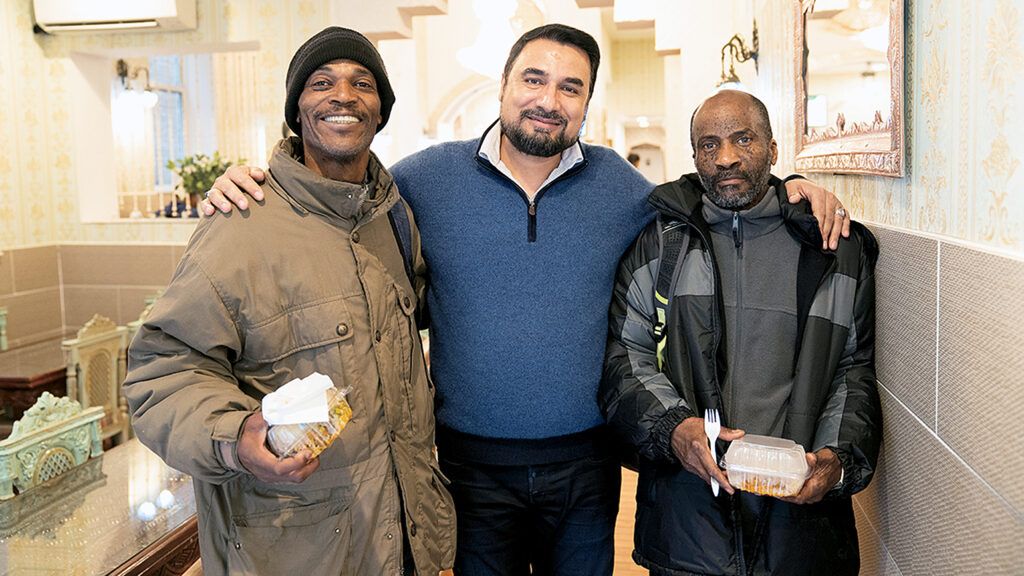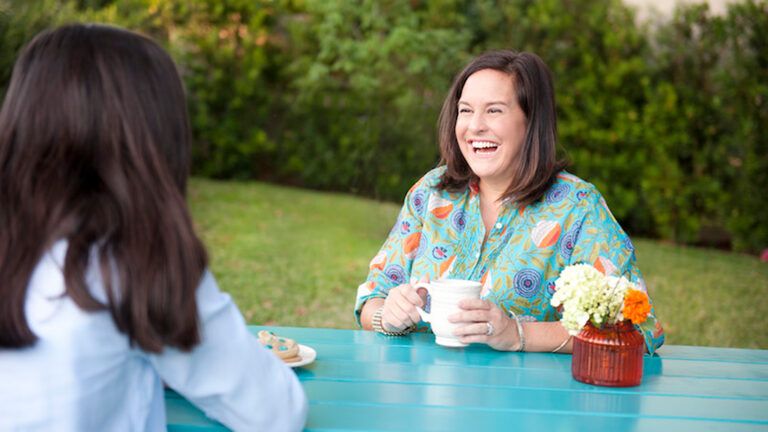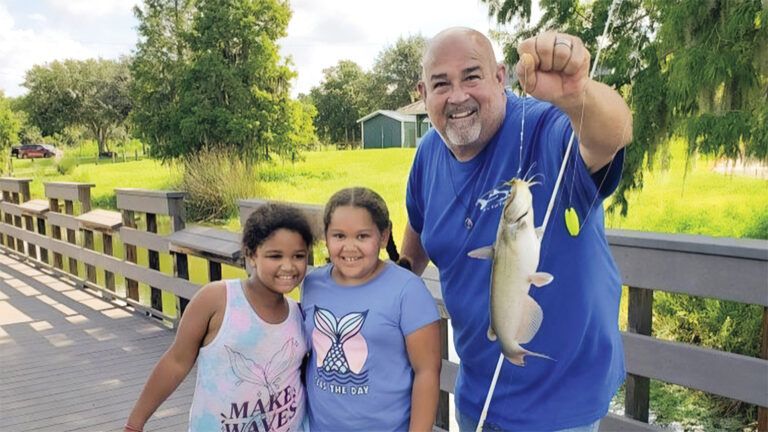Kazi Mannan sits at his usual table in the Sakina Halal Grill, the Pakistani-Indian restaurant he owns in Washington, D.C., a few blocks from the White House. He is just this side of 50, tall and wearing a dark suit. He calls out to a man in a baseball cap headed to the buffet table. “Hey, Derek, how’s it going?”
“The chicken vindaloo is dynamite today,” Derek says. “Going back for some rice pudding. Thanks again, man.”
Kazi smiles and says, “We know all our regulars’ orders by heart.”
Derek is one of a dozen nonpaying customers who’ve come for lunch, most of them homeless. “Family” is how Kazi refers to these customers, who make up about 20 percent of Sakina’s clientele. In the past six years, the restaurant has given away more than 80,000 meals, with many people eating there twice a day. No one is ever turned away for not having money or asked about their circumstances. There’s no judgment, period.
At some tables, those who can’t pay sit side by side with those who can, including White House staffers. Kazi’s philosophy is not just to give away food; learning about one another is equally important. “Food is great magic to bring us together,” he says. His compassion and generosity were inspired by his mother, Sakina, the restaurant’s namesake, who passed away when Kazi was 20. Along with his nine siblings, he was raised Muslim in Pakistan without access to running water or electricity.
“Even though we were very poor, my mother gave away so much food to people in our village that I would get angry with her, afraid there wouldn’t be enough for our family. ‘God will make sure there’s plenty left for us too,’ she would say, and she was right. We never went hungry.”
A woman in a business suit stops by his table. “The waiter told me you’re the owner. It’s wonderful what you’re doing here. I’d like to make a donation.” Kazi shakes his head. “I’m sorry, ma’am, but we don’t take donations. You can support us by buying a meal.”
The woman looks surprised. “Then how on earth do you keep this place open?” she asks. “I never worry about making ends meet,” Kazi tells her. “My only responsibility is to do what I know is right and leave the rest to God.” The woman walks away, smiling.
As a young man, Kazi knew he would have few opportunities in Pakistan. So even though it meant leaving his wife and family behind, he went to America at age 25, arriving with less than five dollars in his pocket. “I spent many nights hungry. You pass by a restaurant, but nobody is going to let you in if you can’t pay.”
He found a job as a gas station attendant in Washington, D.C. He was shocked to see so many people struggling with homelessness. Kazi’s biggest challenge was dispelling the assumptions and perceptions he held of other ethnicities and nationalities he encountered in his new home. “I had to work hard to break down the walls of my own ignorance. But through my experiences with people here, I finally understood that we have much more in common than the media ever shows.”
Kazi’s second job, as a limo driver, allowed him to put by enough money within a few years to buy a small fleet of limos. But despite his business success and growing family, he still felt he didn’t know God’s plan for him. He continued to save as much money as he could, but he never knew for what exactly. He prayed about it daily.
Six years ago, the answer came unexpectedly. Kazi frequented an Indian restaurant downtown and had become good friends with the owner. One day, his friend was complaining about the trials of running his business, and Kazi found the opportunity he’d been waiting for. “I will buy your restaurant,” he said. “Name your price.”
Within a week, the place was his. Kazi set about renovating it: opening up the space, painting the walls a pale yellow and decorating them with traditional Pakistani artwork and tapestries. He bought 30 new tables—some large enough to seat eight—and hung an ornate chandelier for the restaurant’s crowning touch.
The day Kazi opened the Sakina Halal Grill, he drove to a nearby homeless shelter and invited the people he found there to join him in celebration. At first, no one believed him. “Do you swear you’re not going to charge us?” they asked. Soon paying customers were also flocking to the new establishment as word spread about both its noble mission and its good, moderately priced food.
As he goes to check on something in the kitchen, Kazi notices an older woman in a frayed housedress hovering near the door. He introduces himself. “What’s your name?” he asks. “Juliette,” she says softly. “I heard about this place from my cousin. It took me an hour to get here on the bus.” Kazi grabs a menu. “What would you like for lunch, Juliette?”
“I don’t really know these kind of foods,” she says, scanning the menu. “Something with vegetables and meat would be good. And a soda.”
Kazi asks a waiter to bring her vegetable samosas and a lamb curry. “Now let’s sit down and get to know each other,” he tells her, and soon they are chatting like old friends.
“If we would each share a meal once a week with someone less fortunate, the entire world would begin to align with the ultimate goals of peace and understanding,” Kazi says after Juliette finishes her meal and leaves. “Even this small mercy will have a ripple effect.”
Though his beliefs might sound cliché or naive to some, Kazi Mannan puts his money where his mouth is: He has made it his life’s work to feed America’s hungry. To that end, his newest and most far-reaching project is a foundation that will partner with 50 restaurants across the country, all operating on Sakina’s model.
For those who’d like to put their own higher intentions into practice, Kazi suggests what has worked for him: 30 days of performing one act of kindness for someone outside your family, even if it’s simply giving a compliment. Keeping a daily kindness journal also helps. “It’s like going to the gym,” he says. “After a month, it becomes a habit. And if it doesn’t work for you in 30 days, try 45! God is action.”
Derek circles back to Kazi’s table. “This place is the biggest blessing in my life. In some ways, it’s even changed me.”
“Me too,” Kazi says. “Me too.”
For more inspiring stories, subscribe to Guideposts magazine.





